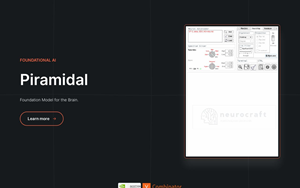Piramidal's $6M Seed Funding: A Leap into AI-Driven Neurology
August 22, 2024, 3:31 pm

Location: United States, Illinois, Chicago
Employees: 501-1000
Founded date: 2011
Total raised: $175M

Location: United States, California, Mountain View
Employees: 51-200
Founded date: 2005
Piramidal Inc. has emerged as a beacon of hope in the complex world of neurology. With a fresh infusion of $6 million in seed funding, the startup is poised to revolutionize how brainwave data is analyzed. This funding round, led by Y Combinator and supported by notable venture capitalists and angel investors, marks a significant milestone in the quest for faster and more accurate diagnoses of neurological conditions.
The human brain is a labyrinth of electrical signals. Understanding these signals is akin to deciphering a foreign language. Traditional methods, particularly electroencephalography (EEG), have long been the gold standard for assessing brain activity. However, the process is fraught with challenges. Neurologists often face a daunting task: sifting through vast amounts of data, interpreting patterns, and making critical decisions based on their findings. Studies indicate that misinterpretation occurs in up to 30% of cases. This is where Piramidal aims to make its mark.
Piramidal's AI model is not just another tool; it’s a game-changer. By harnessing advanced machine learning techniques, the company has developed a proprietary model that analyzes EEG data with unprecedented speed and accuracy. The goal? To reduce the time it takes to diagnose conditions like epilepsy and ultimately expand to a broader range of neurological disorders.
Imagine a world where a neurologist can receive a diagnosis in minutes rather than days. This is the vision Piramidal is chasing. The startup's model is designed to learn from brainwave patterns, much like how large language models learn from text. This unique approach allows the AI to recognize subtle nuances in brain activity that might elude even the most seasoned professionals.
The implications are profound. Faster diagnoses mean quicker treatment. For patients, this could translate to reduced anxiety and improved outcomes. For healthcare systems, it could lead to significant cost savings and enhanced efficiency. The ripple effects of such advancements could be felt across the medical landscape.
Piramidal's co-founders, Dimitris Sakellariou and Kris Pahuja, bring a wealth of expertise to the table. Sakellariou, with a PhD in neuroscience and AI, understands the intricacies of brain function. Pahuja emphasizes the importance of addressing the variability in EEG recordings across different patients and devices. Their combined knowledge is the backbone of Piramidal's innovative approach.
The startup's focus on epilepsy is just the beginning. Future applications could include real-time monitoring of brain health, drug discovery for neurological conditions, and even remote tracking of brainwave abnormalities. The potential is vast, and the need is urgent. As the prevalence of neurological disorders rises, so does the demand for effective diagnostic tools.
However, the journey is not without obstacles. The high costs associated with developing AI models tailored for healthcare have historically hindered progress. Many promising initiatives never see the light of day due to budgetary constraints. Piramidal's recent funding is a crucial step in overcoming these barriers. It provides the necessary resources to refine their model and bring it to market.
Generative AI, the technology underpinning Piramidal's model, is uniquely suited for this task. Unlike traditional methods, which rely on human interpretation, AI can analyze vast datasets at lightning speed. It can identify patterns and anomalies that might go unnoticed by even the most experienced neurologists. This capability could be life-saving, as it allows for earlier detection of conditions that require immediate intervention.
The startup's vision aligns with a broader trend in healthcare: the push for democratization of medical technology. By making advanced diagnostic tools more accessible, Piramidal aims to level the playing field. Smaller clinics and hospitals, often lacking the resources of larger institutions, could benefit immensely from AI-driven solutions.
As Piramidal embarks on this ambitious journey, the excitement in the medical community is palpable. The potential to transform how brain conditions are diagnosed and treated is within reach. With each breakthrough, the company moves closer to its goal of improving patient outcomes and enhancing the efficiency of healthcare systems.
In conclusion, Piramidal's $6 million seed funding is more than just a financial boost; it represents a pivotal moment in the intersection of technology and medicine. The startup's innovative approach to EEG analysis could redefine how neurological conditions are diagnosed, ultimately saving lives and improving the quality of care. As the world watches, Piramidal stands ready to lead the charge into a new era of brain health diagnostics. The future is bright, and the possibilities are endless.
The human brain is a labyrinth of electrical signals. Understanding these signals is akin to deciphering a foreign language. Traditional methods, particularly electroencephalography (EEG), have long been the gold standard for assessing brain activity. However, the process is fraught with challenges. Neurologists often face a daunting task: sifting through vast amounts of data, interpreting patterns, and making critical decisions based on their findings. Studies indicate that misinterpretation occurs in up to 30% of cases. This is where Piramidal aims to make its mark.
Piramidal's AI model is not just another tool; it’s a game-changer. By harnessing advanced machine learning techniques, the company has developed a proprietary model that analyzes EEG data with unprecedented speed and accuracy. The goal? To reduce the time it takes to diagnose conditions like epilepsy and ultimately expand to a broader range of neurological disorders.
Imagine a world where a neurologist can receive a diagnosis in minutes rather than days. This is the vision Piramidal is chasing. The startup's model is designed to learn from brainwave patterns, much like how large language models learn from text. This unique approach allows the AI to recognize subtle nuances in brain activity that might elude even the most seasoned professionals.
The implications are profound. Faster diagnoses mean quicker treatment. For patients, this could translate to reduced anxiety and improved outcomes. For healthcare systems, it could lead to significant cost savings and enhanced efficiency. The ripple effects of such advancements could be felt across the medical landscape.
Piramidal's co-founders, Dimitris Sakellariou and Kris Pahuja, bring a wealth of expertise to the table. Sakellariou, with a PhD in neuroscience and AI, understands the intricacies of brain function. Pahuja emphasizes the importance of addressing the variability in EEG recordings across different patients and devices. Their combined knowledge is the backbone of Piramidal's innovative approach.
The startup's focus on epilepsy is just the beginning. Future applications could include real-time monitoring of brain health, drug discovery for neurological conditions, and even remote tracking of brainwave abnormalities. The potential is vast, and the need is urgent. As the prevalence of neurological disorders rises, so does the demand for effective diagnostic tools.
However, the journey is not without obstacles. The high costs associated with developing AI models tailored for healthcare have historically hindered progress. Many promising initiatives never see the light of day due to budgetary constraints. Piramidal's recent funding is a crucial step in overcoming these barriers. It provides the necessary resources to refine their model and bring it to market.
Generative AI, the technology underpinning Piramidal's model, is uniquely suited for this task. Unlike traditional methods, which rely on human interpretation, AI can analyze vast datasets at lightning speed. It can identify patterns and anomalies that might go unnoticed by even the most experienced neurologists. This capability could be life-saving, as it allows for earlier detection of conditions that require immediate intervention.
The startup's vision aligns with a broader trend in healthcare: the push for democratization of medical technology. By making advanced diagnostic tools more accessible, Piramidal aims to level the playing field. Smaller clinics and hospitals, often lacking the resources of larger institutions, could benefit immensely from AI-driven solutions.
As Piramidal embarks on this ambitious journey, the excitement in the medical community is palpable. The potential to transform how brain conditions are diagnosed and treated is within reach. With each breakthrough, the company moves closer to its goal of improving patient outcomes and enhancing the efficiency of healthcare systems.
In conclusion, Piramidal's $6 million seed funding is more than just a financial boost; it represents a pivotal moment in the intersection of technology and medicine. The startup's innovative approach to EEG analysis could redefine how neurological conditions are diagnosed, ultimately saving lives and improving the quality of care. As the world watches, Piramidal stands ready to lead the charge into a new era of brain health diagnostics. The future is bright, and the possibilities are endless.
